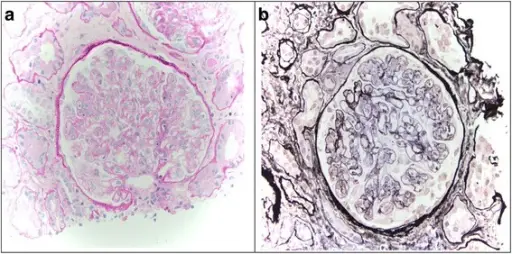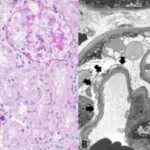Membranoproliferative glomerulonephritis is a disease of the glomerular caused by an abnormal immune response.
What is the Pathology of Membranoproliferative Glomerulonephritis?
The pathology of membranoproliferative glomerulonephritis is the scientific study of the abnormal immune response that leads to glomerulonephritis.
-Etiology: The cause of membranoproliferative glomerulonephritis is an autoimmune response, malignancies, infections,
-Genes involved: Unknown.
-Pathogenesis: The sequence of events that lead to membranoproliferative glomerulonephritis is the deposition of antibodies in the glomerular membrane damaging the membrane hindering it from performing its function normally.
-Morphology: The morphology associated with membranoproliferative glomerulonephritis shows thickening of the capillary walls, diffuse mesangial cell proliferation.
-Histology: The histology associated with membranoproliferative glomerulonephritis shows chunky irregular capillary wall mesangial deposits, endocapillary proliferation.
How does Membranoproliferative Glomerulonephritis Present?
Patients with membranoproliferative glomerulonephritis typically are female and young children present at the age range of 2-30 years. The symptoms, features, and clinical findings associated with membranoproliferative glomerulonephritis include edema, azotemia, cloudy urine, tea-colored urine, reduced urine output.
How is Membranoproliferative Glomerulonephritis Diagnosed?
Membranoproliferative glomerulonephritis is diagnosed by physical examination and history taking, urinalysis, protein levels in urine, creatinine levels, and a kidney biopsy.
How is Membranoproliferative Glomerulonephritis Treated?
Membranoproliferative glomerulonephritis is treated by diuretics, steroids, immunosuppressors, dialysis, or kidney transplant.
What is the Prognosis of Membranoproliferative Glomerulonephritis?
The prognosis of membranoproliferative glomerulonephritis is fair though the long-term effect is chronic kidney disease.



